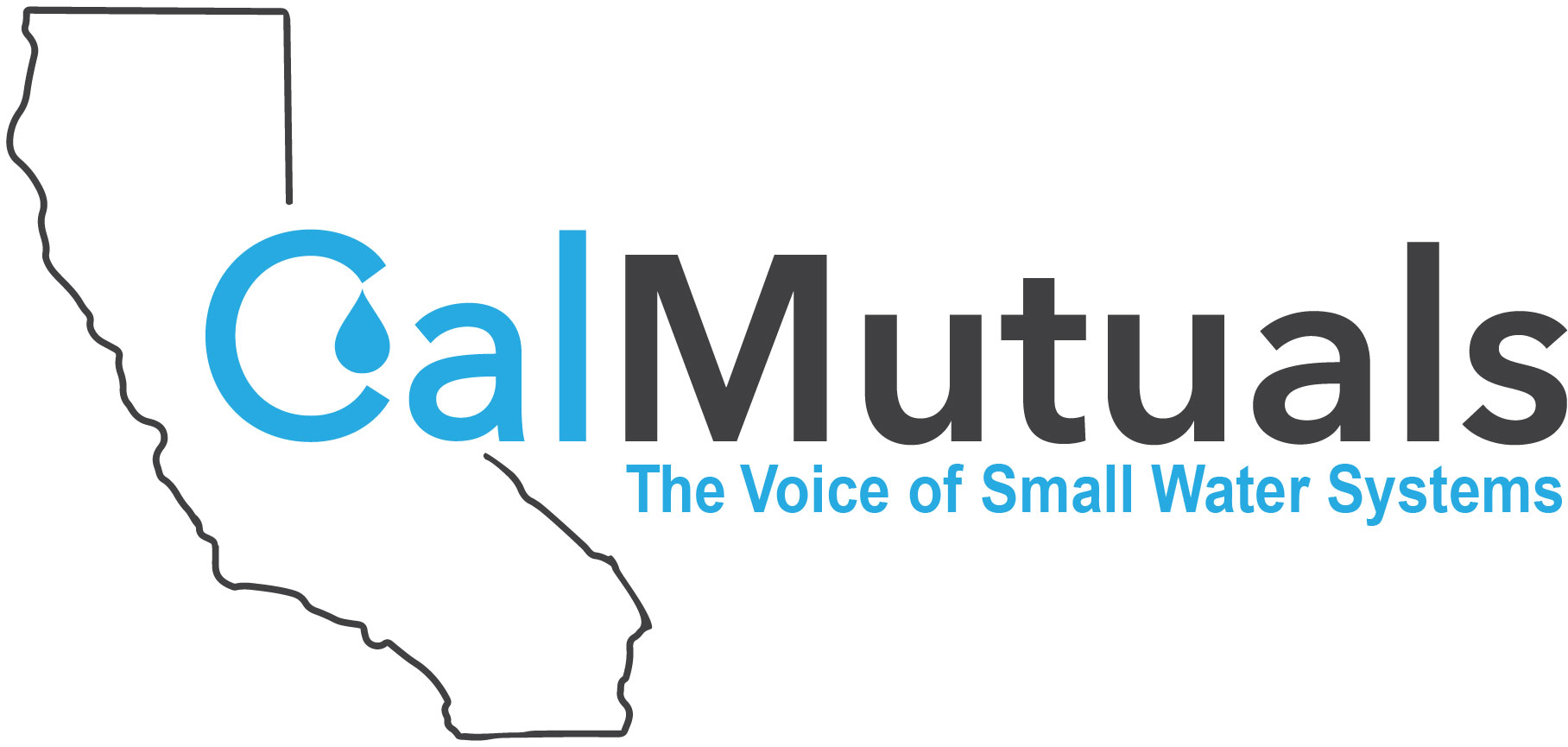2019 CFCC Funding Fairs
The California Financing Coordinating Committee (CFCC) has announced their 2019 Funding Fairs.
Funding Fairs are free and provide opportunities to obtain information about currently available infrastructure grant, loan and bond financing programs and options. Each attendee will receive copies of all slide presentations and additional useful infrastructure financing material. The Funding Fairs also provide an opportunity for attendees to speak directly with program staff about specific projects and issues affecting their community.
To download the 2019 Funding Fair flyer with dates and locations, click here.
For more information and registration links to the Funding Fairs, click here.
New Forum for Small Systems to Work with State on Conservation Mandates
CalMutuals Executive Director Adán Ortega was among the 40-plus invited participants of a new group formed to advise the state on issues faced by operators of small water systems (less than 3,000 connections) in light of state mandates for water conservation stemming from Assembly Bill 1668.
The County Drought Advisory Group (CDAG) aims to help the California Dept. of Water Resources understand the impacts of water shortages during dry periods on small communities and systems. Goals for the group include developing trust between stakeholders, producing vulnerability indicators and draft recommendations.
CalMutuals will continue to participate on behalf of its members to find ways to apply common sense guidelines for water management during future droughts.
New Legislative Year
The California State Legislature’s 2019-2020 session is currently underway. We’ll be watching for bills addressing important water infrastructure and regulation issues. Already on our radar is Governor Gavin Newsom’s budget, which includes the “Safe and Affordable Drinking Water Fund,” a proposed special fund from new water, fertilizer, and dairy taxes to help chronically failing water systems meet O&M costs.
It also includes $4.9 million from the General Fund on a one-time basis for implementation of the program, including development of a map of high-risk aquifers used as drinking water sources. The Legislature has until June 15 to pass the budget, so stay tuned as we monitor progress on this and other critical issues affecting mutual water companies.
2019 Membership Dues Renewal
Holiday Message from CalMutuals President & CalMutuals-JPRIMA CEO
 We look back at 2018 with pride and gratitude for you, our members.
We look back at 2018 with pride and gratitude for you, our members.
Since CalMutuals founding in 2013, we have grown from 14 original founders to over 300 members. CalMutuals has become recognized across the state as “the voice for small water systems.” We are regularly consulted by key legislators, state agencies and other stakeholders on legislation and regulations — including a number of state agency work groups about drought planning, water quality and implementation of the State’s Human Right to Water legislation. In sum, we represent small systems as essential contributors to solutions that will ensure that Californians from all walks of life will have safe and affordable water.
CalMutuals Joint Powers Risk and Insurance Management Authority (JPRIMA), in its third year, has fast earned a reputation as the best in-class insurance for water systems of all types. JPRIMA reinvests in its members and insureds and through its success has been able to fund free resources for members with fewer than 500 connections. New resources introduced in 2018 include a comprehensive slate of continuing education courses in partnership with the American Water College, a video library of video resources for managers in partnership with AADW&M and background checks that provide the insights to help reduce liability while dramatically improving the quality of talent in partnership with OPENOnline.
All this being said, we owe our success to a dedicated Board of Directors who volunteer their time and talents, and to our growing list of members.
2019 will bring all sorts of challenges – some anticipated and others not. But for now, we would like to thank you and wish you a happy holiday season.
![]()
Please Join CalMutuals in Urging California Senators to Co-Sponsor the Water Act
CalMutuals is urging Senator Dianne Feinstein and Senator Kamala Harris to co-sponsor S. 1090, the Water and Agriculture Tax Reform Act of 2017 (the WATER Act).
Mutual Water Companies are member-owned water supply organizations categorized as 501(c)(12) not-for-profit entities. In order to maintain that not-for-profit status, current law requires that no less than 85 percent of the costs of water infrastructure projects are paid for by members themselves. This rule dis-incentivizes investment in the maintenance of existing infrastructure and the construction of new infrastructure.
If passed, the WATER Act would allow mutual water companies to use additional revenue from non-member sources to fund water infrastructure projects without jeopardizing the non-profit status. For instance, the bill would allow mutual water companies to generate additional revenue by selling excess land or leasing excess water rights and using the proceeds to improve service or invest in water-saving infrastructure improvements.
Please join our efforts by submitting this letter to Senator Feinstein and this letter to Senator Harris on your company’s letterhead.
For questions, please contact Susan@CalMutuals.org or call Susan at (714) 449-8403.
CalMutuals Appointed as Member of County Drought Advisory Group
In 2018, the California State Legislature (Legislature) enacted two long-term water conservation policy bills, AB 1668 (Friedman) and SB 606 (Hertzberg). The two policy bills require the State Water Resources Control Board (Water Board) and the Department of Water Resources (DWR), to establish long-term water conservation and drought planning.
As an initial implementation action, the Water Board and DWR released a primer to summarize the authorities, requirements, and schedules included in the new legislation. Among the laws’ requirements, is the formation of advisory groups to solicit input and feedback on the implementation of the two policy bills.
CalMutuals Executive Director Adán Ortega has been selected to serve as an official member of the County Drought Advisory Group (CDAG). As a member of CDAG, Executive Director Ortega will work with other stakeholders to develop recommendations for water shortage contingency planning. The first CDAG meeting will take place on December 13th.
For more information, please contact Adan@CalMutuals.org.
Message from CalMutuals Executive Director
Dear CalMutuals Members –
It’s with great respect and pride that I would like to announce that CalMutuals Managing Director Denise Peralta Gailey will be leaving CalMutuals on December 11th, to begin another position in January. As you know, Denise has worked alongside our board of directors, members and myself, for the last five years.
During her time with CalMutuals, she’s been part of a family of leaders who helped grow our organization from 14 original members to over 300 today.
Many of you know Denise for her excellent grasp of policy, legislation, and technical referrals. Others witnessed her leadership in generating dozens of letters in support (or opposition) to bills we targeted.
In these final days, I am experiencing bittersweet moments seeing her leave. I am proud that Denise crossed our door and earnestly worked to master her talents. I will miss our daily interactions and look forward to watching her thrive in her new role. I urge you to stay in touch with her. This young woman, leader and friend is going places!
Until further notice, please feel free to contact Susan Allen for general inquiries and requests at susan@calmutuals.org or call Susan at (714) 449-8403.
Adán Ortega
Executive Director, CalMutuals
Long-Term Water Conservation Bills Enacted: What’s Next for Urban Water Suppliers?
Earlier this year, Governor Brown signed two long-term water conservation bills, AB 1668 (Friedman) and SB 606 (Hertzberg).
Together, the two bills require the State Water Resources Control Board (Water Board) and the Department of Water Resources (DWR), to establish long-term urban water use efficiency standards for urban retail water suppliers (3,000 svc conns or ≥3,000 AF) by June 30, 2022. Those standards will include components for indoor residential use, outdoor residential use, water losses and other uses.
Below is an overview of the two water-efficiency bills:
- Outlines reporting requirements for water suppliers and specifies penalties for violations.
- Establishes water use objectives, standards and reporting requirements for indoor and outdoor residential water use, commercial, industrial, and institutional (CII) landscape areas, water losses, and other unique local uses.
- Provides options for meeting water use objectives if there are reasons why a utility can not meet the required 50 gallons per person per day goal by 2030.
- Revises the Agricultural Water Management Planning Act to increase the efficiency of agricultural water use.
- Requires DWR, the State Water Board, and other relevant stakeholders to identify small water suppliers and rural communities that may be at risk of drought and water shortage vulnerability and provide recommendations for drought planning.
- Outlines requirements for urban water suppliers, and specifies penalties for violations. The bill contains distinct provisions on water shortage planning and water loss reporting for urban wholesale water suppliers and establishes a bonus incentive for potable reuse water.
- Establishes urban water use objectives and reporting requirements for urban water suppliers by requiring an urban water supplier to calculate an aggregate urban water use objective.
- Substantially revises the requirements under the Urban Water Management Planning Act. Specifically, requires urban water suppliers to conduct annual drought risk assessments and to submit an annual report to DWR.
- Requires the adoption of a water shortage contingency plan, which must include certain elements, annual drought risk assessment procedures, and standard water shortage levels.
What’s Next?
DWR and the State Board will be holding joint workshops on AB 1668/SB 606 implementation. More information on the meetings is expected soon.
Key Deadlines for Urban Water Suppliers:
June 1, 2019
Submit annual water shortage assessment to DWR.
November 1, 2023, and annually thereafter:
Deadline to calculate urban water use objective and report to DWR
Deadline to calculate previous years’ actual urban water use and report to DWR.
January 1, 2024
Submit to DWR a supplement to adopted 2020 plan.
January 1, 2025
Abide by standard for indoor residential water use of 52.5 gcpd.
January 1, 2027
Provide narrative in addition to supplement that describes water demand management measures that supplier plans to implement to achieve its 2027 urban water use objective.
January 1, 2030
Abide by standard for indoor residential water use of 50 gpcd.
For more information, please contact Susan@CalMutuals.org
Changes to Drinking Water Operator Certification Program
The responsibility of California’s Drinking Water Operator Certification Program (DWOCP) has been transferred from the California Department of Public Health to the State Water Resources Control Board (SWRCB) resulting in changes to the program. Those changes include the addition of Administrative Civil Liabilities (in the form of fines or other actions) for Water Treatment and Water Distribution Operators.
Penalties range from $100 per day to $5,000 for each violation, depending on the type of infraction.
Violations may include but are not limited to:
- Operating without a valid or expired certification of the appropriate grade;
- Use of fraud or deception in the course of operating a water distribution system;
- Willful or negligent acts that cause or allow a violation of the federal or California Safe Drinking Water Act or the regulations or standards adopted pursuant to either act.
For questions, please contact the Drinking Water Operator Certification Program at (916) 449-5611 or e-mail them at dwopcertprogram@waterboards.ca.gov
